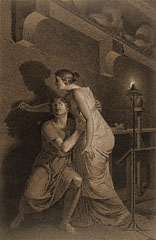| November 2004 | ||||||
| Sun | Mon | Tue | Wed | Thu | Fri | Sat |
| 1 | 2 | 3 | 4 | 5 | 6 | |
| 7 | 8 | 9 | 10 | 11 | 12 | 13 |
| 14 | 15 | 16 | 17 | 18 | 19 | 20 |
| 21 | 22 | 23 | 24 | 25 | 26 | 27 |
| 28 | 29 | 30 | ||||
| Oct Dec | ||||||
rogueclassicism home
Bulletin Board
Classical Employment
Classical Events
Miscellaneous Announcements
Weekly Newsletters
Explorator
The Ancient World on Television (Weekly)

|
~ The Origin of Painting The Guardian begins an artsy column with a tale from Pliny the Elder:
There's an interesting picture of the first part of this story at the Getty: There's a great article on this 'genre of the image' in an interesting article in the Art Bulletin by Frances Muecke (alas, no images in the Findarticles.com version) ... here's a bit just past the introduction:
Here's the tale as told by Pliny hisself (35.151 via Lacus Curtius):
::Saturday, November 06, 2004 8:04:04 AM:: |
|
~ Alexander Hype Nice bit of Alexander-the-movie hype from the Orlando Sentinel, replete with comments from ancient historians we will likely be hearing plenty from in the next few weeks:
Just in passing, we might note that the opening line of this one clicked the 'conspiracy switch' in my skull (a switch I try very hard to suppress, but which every now and then sneaks into the 'on' position). So anyway, the incipient conspiracy goes like this ... Oliver Stone calls in a favour lingering from his movie about JFK so the U.S. would formally recognize "Macedonia", raising the ire of the Greeks who, of course, will be very vociferous in their protests and repeatedly mention Macedonia and Alexander the Great, hot on the heels of an election which nobody in the Hollywood community (save for Arnie) understands so that when it comes Oscar time, voting for Alexander the Great will become a political protest as much as a judgement of a film. Whew! (now you can see why I suppress this thing) ::Saturday, November 06, 2004 7:38:26 AM:: |
|
~ Classical Allusions and Arafat Arab News has a piece about the impending death of Yasser Arafat, interspersed with Classical (and other-cultural) allusions. Snippets:
Folks monitoring the Arafat situation might also want to check out a piece in Dissident Voice, which has a piece opening with this snippet:
::Saturday, November 06, 2004 7:30:20 AM:: |
|
~ Taking on the Bunnies From Strathearn News comes this timely tale:
::Saturday, November 06, 2004 7:21:46 AM:: |
|
~ CONF: Classical Language Teaching Current Issues, Future Strategies: Classical Language Teaching at University Further offers of papers welcome. This event is being organised by the Classics section of The Subject Centre for History, Classics and Archaeology*. The conference aims to provide a forum to discuss issues of concern in language learning and teaching in Higher Education, but participation from teachers in schools and colleges is very welcome. Confirmed contributors include Ken Belcher (University of Leeds), Lynette Mithcell (University of Exeter) and Will Griffiths (Cambridge School Classics Project). There is no registration fee for attending and some lunch will be provided. For more information, contact: Dr David Fitzpatrick ... seen on the Classicists list ::Saturday, November 06, 2004 7:17:37 AM:: |
|
~ CONF: Spades and Stages The Corpus Christi Centre for the Study of Greek and Roman Antiquity and the Centre for Roman Provincial Archaeology, University of Durham present Spades and Stages A one-day colloquium
Programme 10.30 Coffee and registration 11.00-12.30 First Session (chair : Richard Hingley) Stephen Harrison (Oxford) 'Lytton and Pompeii : Archaeology and Fiction' Phiroze Vasunia (UNC, Chapel Hill/Oxford) 'Rome in Hindostan: Architecture and the Classical Revival in British India' 12.30-1.30 Lunch 1.30-3.00 Second Session (chair : Stephen Harrison) Edith Hall (Durham) 'Sophocles and Stonehenge in the 18th century' Richard Hingley (Durham) 3.00-3.30 Tea 3.30-5.00 Third Session (chair : Edith Hall/Oliver Taplin) Fiona Macintosh (Oxford) 'Mounet-Sully and the classical ideal' Debby Challis (Birkbeck) 'The British Museum and Greek theatre in Victorian London' 5.00 Round-up session and close (by 5.30). Those wishing to attend should book a place with Stephen Harrison at Corpus Christi College, Oxford, OX1 4JF by 1st December 2004, enclosing a conference fee of £10 (cheques payable to ‘Corpus Christi College, Oxford’, please). Any enquiries to Stephen.harrison@ccc.ox.ac.uk. ... seen on the Classicists list ::Saturday, November 06, 2004 7:15:00 AM:: |
|
~ AWOTV: On TV Today ... nothing of interest ::Saturday, November 06, 2004 7:10:32 AM:: |
BLOGWATCH
About.com
Ancient/Classical History
ARLT
Association for Latin Teaching
Blogographos
Blogging for the Demos
Christian Origins
Kirby's blog and sundry essays about early Christianity
Curculio
The Web Page of Michael Hendry
Campus Mawrtius
Male Graduate Students: Unserious in Terms of Studies Since 1931.
CCC
Classics in Contemporary Culture
Classico e Moderno
L'antichità greca e latina in rapporto alla quotidianità
Hobbyblog
Documenting an ancient coin collection
Hypotyposeis
Sketches in Biblical Studies
Laudator Temporis Acti
Complaints about this and that ...
Martialis
The Epigrams of Martial
NT Gateway
New Testament studies and related material
PaleoJudaica
Ancient Judaism and its context
Philo of Alexandria
Studies of Philo of Alexandria and the Diaspora Judaism of his time
Sauvage Noble
An austronesian's adventures in altertumswissenschaft and indogermanistik
Stoic News
Stoic Philosophy in the 21st Century


1. n. an abnormal state or condition resulting from the forced migration from a lengthy Classical education into a profoundly unClassical world; 2. n. a blog about Ancient Greece and Rome compiled by one so afflicted (v. "rogueclassicist"); 3. n. a Classics blog.

